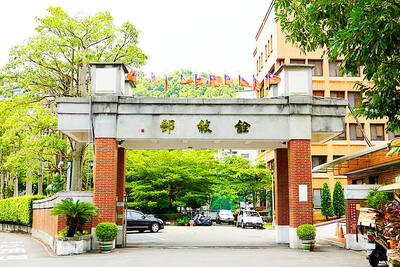President Chen Shui-bian (陳水扁) hopes to use an upcoming visit by former US President Bill Clinton as an opportunity to discuss global issues.
"During the meeting with Mr Clinton, President Chen will not focus on local issues and will only narrowly discuss affairs such as China policy or Taiwan's stance," sources from the Presidential Office told the Taipei Times yesterday.
"The president expects that dialogue will touch extensively on the trend of globalization and the New World Order."
Though the government did not arrange Clinton's visit, officials hope the public will take a positive attitude toward Clinton and welcome him as an influential guest.
"The Taiwanese people should not judge the former US president harshly because of his pro-China stance," the official said.
The official said that many Taiwanese may still harbor resentment toward Clinton because of his "three nos" policy, which he articulated in Shanghai during his 1998 tour of China.
"But the president hopes Taiwan's people will pay more attention to how `the Clinton experience' can inspire the country," the official said.
The "three nos" policy held that the US would not support independence for Taiwan; a "two Chinas" or "one Taiwan, one China" policy; or support Taiwan's membership in any organization for which statehood is a requirement.
Among Taiwan's political circles the "three nos" were viewed as the biggest blow to US-Taiwan ties since 1979, when Jimmy Carter's administration cut official ties with the country.
DPP lawmaker Parris Chang (
"We don't expect Mr Clinton to apologize to Taiwan for these blows in his upcoming speech in Taipei," Chang said in his article. "But we hope he will not continually promote the `one China' policy for Beijing."
"We also hope Clinton can sincerely examine Taiwan's achievements in democracy, freedom, and human rights -- which is totally different from the situation in China," Chang added, "and to share his observations with his Democrat colleagues in the US -- to convince them to support this free country."
The Presidential Office said that Chen was especially interested in Clinton's experiences in overcoming the political struggles of the early days of his presidency.
It is inevitable that political observers will compare President Chen with Clinton, a source from the President Office said, and the comparison will help Clinton to get a clearer picture of Taiwan's people.
The source said presidential staff believe that Clinton's visit will receive more public attention than any other recent foreign leader's visit.
Since Chen came to power in May last year, the visits of world leaders have sparked controversy.
These included visits from the likes of Singapore Senior Minister Lee Kuan Yew (李光耀) in September of last year and former South Korean president Kim Young-sam (金泳三) in July of this year.

Taiwan Semiconductor Manufacturing Co (TSMC, 台積電) is expected to start construction of its 1.4-nanometer chip manufacturing facilities at the Central Taiwan Science Park (CTSP, 中部科學園區) as early as October, the Chinese-language Liberty Times (the Taipei Times’ sister newspaper) reported yesterday, citing the park administration. TSMC acquired land for the second phase of the park’s expansion in Taichung in June. Large cement, construction and facility engineering companies in central Taiwan have reportedly been receiving bids for TSMC-related projects, the report said. Supply-chain firms estimated that the business opportunities for engineering, equipment and materials supply, and back-end packaging and testing could reach as high as

CHAMPIONS: President Lai congratulated the players’ outstanding performance, cheering them for marking a new milestone in the nation’s baseball history Taiwan on Sunday won their first Little League Baseball World Series (LLBWS) title in 29 years, as Taipei’s Dong Yuan Elementary School defeated a team from Las Vegas 7-0 in the championship game in South Williamsport, Pennsylvania. It was Taiwan’s first championship in the annual tournament since 1996, ending a nearly three-decade drought. “It has been a very long time ... and we finally made it,” Taiwan manager Lai Min-nan (賴敏男) said after the game. Lai said he last managed a Dong Yuan team in at the South Williamsport in 2015, when they were eliminated after four games. “There is

Democratic nations should refrain from attending China’s upcoming large-scale military parade, which Beijing could use to sow discord among democracies, Mainland Affairs Council Deputy Minister Shen You-chung (沈有忠) said. China is scheduled to stage the parade on Wednesday next week to mark the 80th anniversary of Japan’s surrender in World War II. The event is expected to mobilize tens of thousands of participants and prominently showcase China’s military hardware. Speaking at a symposium in Taichung on Thursday, Shen said that Chinese Minister of Foreign Affairs Wang Yi (王毅) recently met with Indian Prime Minister Narendra Modi during a visit to New Delhi.

FINANCES: The KMT plan to halt pension cuts could bankrupt the pension fund years earlier, undermining intergenerational fairness, a Ministry of Civil Service report said The Chinese Nationalist Party (KMT) caucus’ proposal to amend the law to halt pension cuts for civil servants, teachers and military personnel could accelerate the depletion of the Public Service Pension Fund by four to five years, a Ministry of Civil Service report said. Legislative Speaker Han Kuo-yu (韓國瑜) on Aug. 14 said that the Act Governing Civil Servants’ Retirement, Discharge and Pensions (公務人員退休資遣撫卹法) should be amended, adding that changes could begin as soon as after Saturday’s recall and referendum. In a written report to the Legislative Yuan, the ministry said that the fund already faces a severe imbalance between revenue